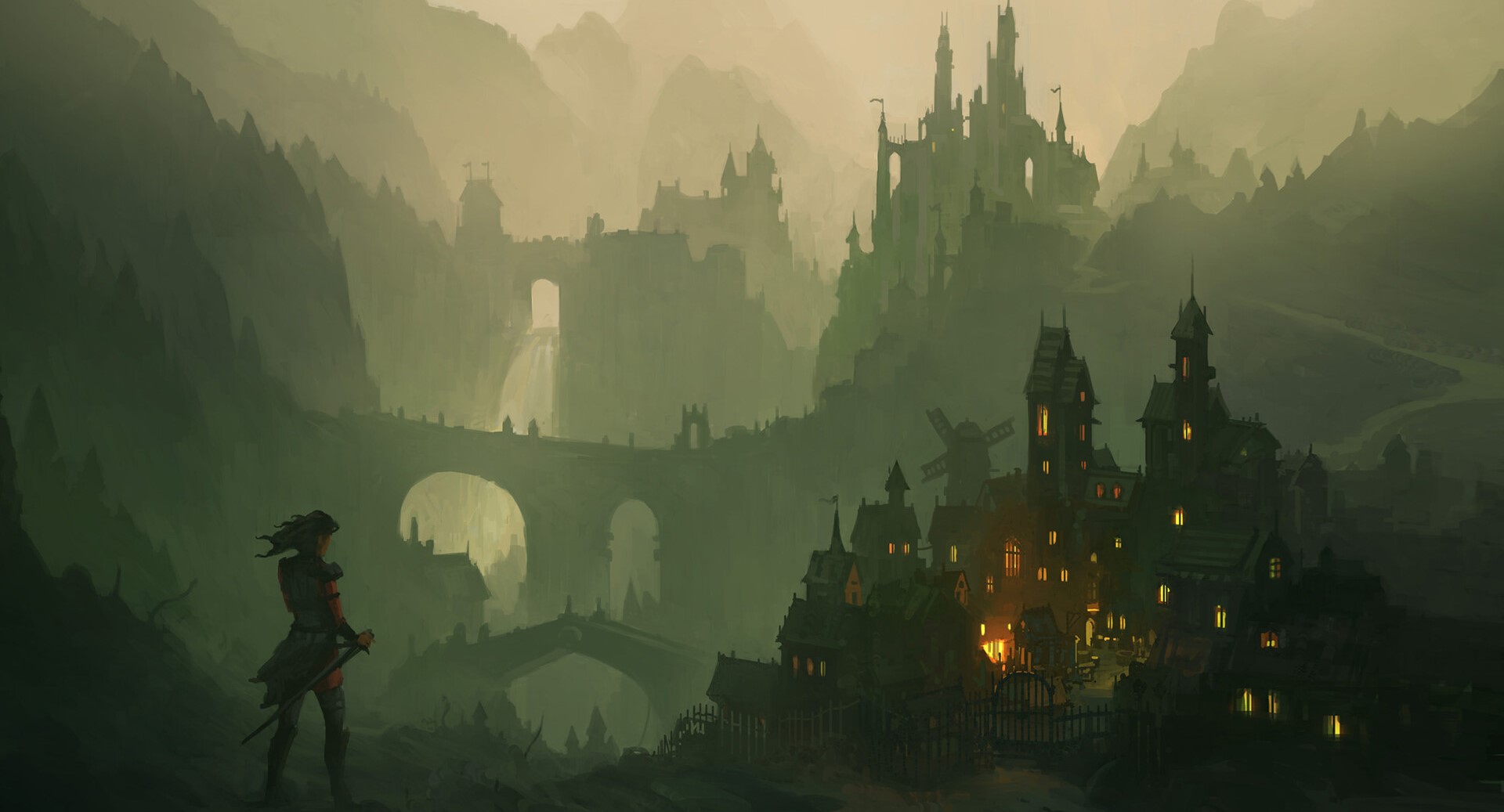Abendland
Abendland is the region where Aurelia, Goddess of Healing, Hearth, and Home, perished.
A part of her celestial body rests within the province, where it still radiates a small part of her sacred magic.
The capital city of Altenheim is the largest city in the Bürach Empire. As the saying goes, “All roads lead
to Altenheim.” Trade routes eventually find their way here, some from as far away as Grarjord. It
is also the safest location in all of the Empire, as Altenheim is known for its high walls and towers that make a siege unlikely to succeed.
Assets
It can be said that Altenheim runs on hope, such
as it is, as the lands surrounding the province of
Abendland were greatly affected by the death of
the gods. While still fertile, they are slowly losing
potency due to the waning influence of Aurelia.
The city of Altenheim, however, has continued to
flourish. Like a tumour syphoning the nutrients
from a healthy body, it draws all the wealth and
produce from the surrounding province into its
coffers. Its vast tracts of farmland still produce
enough grain and fruit for trade outside of
the empire.
While the peasants suffered, the city-dwellers
took to revelry and worldly pleasures to forget the
horrors of the past and present. Trade routes to
the Valikan clans brought in a supply of Dreams
Leave, an addictive substance that soon had many
citizens in its grip.
The walls of Altenheim grew taller and thicker
over the years, to guard its wealth and secrets
against would-be thieves--but more importantly,
to keep its citizens from looking to the
world outside.
History
Since time immemorial, Abendland had been
ruled by the Holy Church of the Hearthkeepers,
clerics of the goddess Aurelia. According to
legend, Aurelia herself led the first of her priests,
Amara, to the western plains in order to escape
the tyrannical ruler of her former tribe. There, the
goddess ordered Amara to strike the arid ground
with her spear. From that spot emerged a spring
of crystal clear water. The spring became the
sacred lake, Osea, which fed the land and the city
of Altenheim, until it turned verdant and green.
Abendland’s open plains, situated in the clearings
between dense forest, facilitated farmlands and
plantations, feeding its growing population.
The Hearthkeepers encouraged and spread
the worship of Aurelia, promising peace and
prosperity to all who followed her. And many did.
Abendland consequently became known as the
land of clerics and paladins, and Altenheim gained
the title of “The City of Joy”.
When Emperor Indorious was crowned, the
Hearthkeepers welcomed him with open arms.
He was the only son of Aurelia, they said, the
promise of the goddess made flesh. They threw
all their power and resources into supporting
his rule, and taught the Abendfolk from youth to
revere the Emperor. Thus, the Imperial family
and the Hearthkeeper religion became tied
together forever as a political body. For centuries,
the clerics have legitimised the rule of each
Emperor, and used their influence to keep his
bloodline pure.
The coming of Leopold I brought an end to this
golden age. His madness seeped into Aurelia’s
holy artifact, the Hearthfire Breastplate, and
reached the mind of the goddess herself.
Aurelia became jealous of her people’s devotion.
She demanded adoration, prayers, tributes, a
lifetime of servitude from her followers, all
while fawning over Leopold. In the end, she even
demanded blood sacrifices. All of this was an
effort to show she was the one true god, the most
deserving of worship. As for her priests, they
willingly followed her whims and those of the
emperor. They had lived too long in the comfort
of authority to give it up.
Finally, Aurelia went to war with the other three
gods. Thus distracted, she did not see when one
of her priestesses, Talana, turned on her.
Conspiring with like-minded individuals from
the other three provinces, Talana opened the way
for the assassins to infiltrate the Imperial Palace.
It worked, and with Leopold dead, the assassins
seized control of the artifacts. Galt, Maligant,
and Ulmyr remained mad, but Aurelia—perhaps
because she was the goddess of protection—
managed to break out of her insanity.
Seeing the devastation caused by the war, she used
all her power to protect her people from the Gods’
End. The sacrifice consumed all that was left of her
power. Aurelia plunged to Etharis, lifeless.
After the Gods’ End, Altenheim did its best
to rebuild. The Church of the Hearthkeepers
installed a new emperor, replaced the missing
artifacts with fakes, and led the people to
continue their veneration. But to their horror,
the priests found that their clerical abilities were
slowly fading as the remnant of Aurelia’s power
waned from the world. Thus, they withdrew from
the public and spread myths among the people:
that Aurelia was not dead but merely sleeping,
that she would rise again to restore her people to
the glory of the Empire’s early days.
Soon the concept of “protection” took on a
different meaning in the City of Joy. The citizens
had to be protected from the corruption of the
outside world. They had to be brought closer to
the light of Aurelia’s hearth. They need to be
sheltered from the harsh realities of the Gods’
End. Dissent among the populace was dealt with
harshly. Any talk of a horned shadow monster
roaming the lands was silenced.

Type
Geopolitical, Province
Leader
Parent Organization
Related Ethnicities



Comments